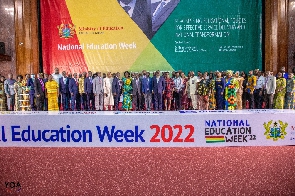 Participants at the National Education Week
Participants at the National Education Week
The 2022 edition of the National Education Week has been launched on Monday, October 10, 2022, with a call on managers of educational resources to efficiently use the limited resources available and desist from politicizing the management of the sector to create a better future for the nation. The launching of the event brought together national stakeholders from all sub-sectors within the education space who would be engaging in stocktaking, looking at various policies in the sector and planning for the development of the sector. Launching the event, Mr Yaw Osafo-Marfo, Senior Presidential Advisor, was upbeat that everything possible would be done by the government to protect the budget and gains made in the education sector. He explained that the critical role played by the education sector requires that it should be granted the right resources to ensure that it trains the right manpower needs of the country. IMF discussion Mr Osafo-Marfo indicated that government will endeavour to maintain its desire to sustain the gains made so far with the introduction of the Free Senior High School policy in its ongoing negotiations with the International Monetary Fund (IMF). He lauded the Education Minister for his vision and strong desire towards the development the transformation of the nation's economy. The Special Advisor mentioned the government’s commitment of funds to the education sector to boost efforts being made to deepen access and quality STEM Education across all levels in all regions and roll out the Communities of Excellence program across the country. Again, he indicated that the government remains resolute in ensuring that all children acquire Literacy and Numeracy skills at grade 4. Mr Osafo-Marfo noted that government further wants to create opportunities for out-of-school children to access basic education while consolidating the free SHS policy to include free TVET as well as equip Ghanaian Youth with 21st Century Skills to enhance their global competitiveness. Government’s commitment The Deputy Minister for Education in charge of General Education, Rev. John Ntim Fordjour, indicated that the government is committed to resolving all challenges confronting the sector. He used the occasion to praise various stakeholders in the education sector who keep playing diverse roles in ensuring that the nation's education moves smoothly. The Deputy Minister of Education reiterated that reassessing educational policies as outlined in the theme for the commemoration was very important and its essence could not be overemphasized. He urged the participants to make quality inputs that will stand a chance of improving the sector towards the transformation of the nation’s economy Background This year's National Education Week (NEW) has the theme: 'Re-assessing Educational Policies for Effective Service Delivery and National Transformation’. It is being participated by approximately 300 officials drawn from the Education Ministry, officials from Agencies, Regional Directors of Education, selected District Directors, Heads of Schools and representatives from other ministries, development partners, academia, teacher unions, NGOs, CSOs, and the private sector.
The 2022 edition of the National Education Week has been launched on Monday, October 10, 2022, with a call on managers of educational resources to efficiently use the limited resources available and desist from politicizing the management of the sector to create a better future for the nation. The launching of the event brought together national stakeholders from all sub-sectors within the education space who would be engaging in stocktaking, looking at various policies in the sector and planning for the development of the sector. Launching the event, Mr Yaw Osafo-Marfo, Senior Presidential Advisor, was upbeat that everything possible would be done by the government to protect the budget and gains made in the education sector. He explained that the critical role played by the education sector requires that it should be granted the right resources to ensure that it trains the right manpower needs of the country. IMF discussion Mr Osafo-Marfo indicated that government will endeavour to maintain its desire to sustain the gains made so far with the introduction of the Free Senior High School policy in its ongoing negotiations with the International Monetary Fund (IMF). He lauded the Education Minister for his vision and strong desire towards the development the transformation of the nation's economy. The Special Advisor mentioned the government’s commitment of funds to the education sector to boost efforts being made to deepen access and quality STEM Education across all levels in all regions and roll out the Communities of Excellence program across the country. Again, he indicated that the government remains resolute in ensuring that all children acquire Literacy and Numeracy skills at grade 4. Mr Osafo-Marfo noted that government further wants to create opportunities for out-of-school children to access basic education while consolidating the free SHS policy to include free TVET as well as equip Ghanaian Youth with 21st Century Skills to enhance their global competitiveness. Government’s commitment The Deputy Minister for Education in charge of General Education, Rev. John Ntim Fordjour, indicated that the government is committed to resolving all challenges confronting the sector. He used the occasion to praise various stakeholders in the education sector who keep playing diverse roles in ensuring that the nation's education moves smoothly. The Deputy Minister of Education reiterated that reassessing educational policies as outlined in the theme for the commemoration was very important and its essence could not be overemphasized. He urged the participants to make quality inputs that will stand a chance of improving the sector towards the transformation of the nation’s economy Background This year's National Education Week (NEW) has the theme: 'Re-assessing Educational Policies for Effective Service Delivery and National Transformation’. It is being participated by approximately 300 officials drawn from the Education Ministry, officials from Agencies, Regional Directors of Education, selected District Directors, Heads of Schools and representatives from other ministries, development partners, academia, teacher unions, NGOs, CSOs, and the private sector.